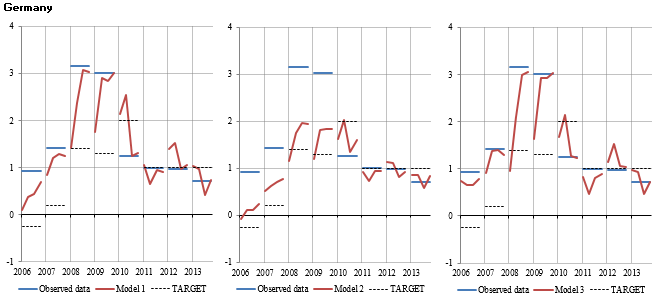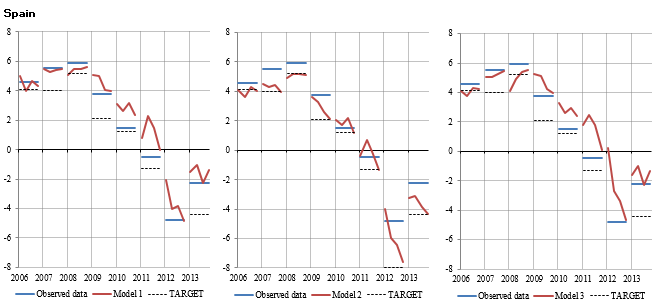Should we trust governments’ fiscal plans?

Stay up to date:
Geo-economics
One of the main tasks of governments is to define tax and public spending policies. At least once a year, they prepare fiscal plans within the annual budget for the next year. Governments can deviate ex post from the announced policies – and we know from the literature that they do. Such ex post policy changes are typically related to strategic political behaviour, for example, when facing elections (e.g. von Hagen 2010, Pina and Venes 2011, Jong-a-Pin et al. 2012, Frankel and Schreger 2013, Merola and Pérez 2013, Cimadomo 2014, and the references quoted therein). But uncertainty about future (fiscal) policies is damaging for economic performance given that it affects the ability of individual agents to ground decisions about future consumption, investment, and saving plans.
Reducing the uncertainty of fiscal policy
Is there a way to reduce uncertainty about the future course of fiscal policies? In a recent paper (Paredes et al. 2015), we show that this indeed is the case. For that, the analyst (econometrician) has to learn about fiscal plans from three pieces of information:
- What the government says it will do, i.e. the fiscal policy plan (target) itself.
- What the government is actually doing today through the observation of incoming data on the actual degree of implementation of those plans.
- What the government said in the past it would do and what it actually did; this is a way of assessing credibility on the basis of past (mis)behaviour.
Policy plans should convey information about the future course of policies, but may be subject to political discretion. If past policies were bad predictors of policies observed ex post, then the probability assigned today to the commitment of the government to current fiscal plans should be low. At the same time, learning from short-term fiscal data poses a signal extraction problem, in particular bearing in mind that future policies convey, by definition, forward-looking information, while data refer to backward-looking information.
To solve this dilemma, we formulate and estimate empirical models (mixed-frequencies and state-space models estimated with the Kalman Filter) for a number of EU countries, focusing on government consumption plans. In our models, the analyst learns about the sources of information mentioned above: backward-looking and forward-looking. The weights assigned in each moment of time to each type are determined empirically by the model.
We make two relevant findings.
- First, our models are instrumental in unveiling the current course of policy in real time. This is not a trivial task, given the amount of noise that typically accompanies fiscal data.
- Second, and most importantly, we show that government consumption targets (plans) convey useful information about ex post policy developments, in particular when policy changes significantly (and even if past credibility is low) and when there is limited information about the implementation of plans (e.g. at the beginning of a fiscal year).
Without entering into technicalities, let us show how the learning method works. In Figure 1 we plot iterative forecasts from models for two EU countries (Spain and Germany) under different assumptions, in other words, we show how three models learn and adapt throughout the year to new incoming information. In the figure we show the observed annual rate of growth of ex post real government consumption (solid line), the annual targeted rate of growth (fiscal plan) (dotted line), and the sequence of forecasts for the whole year (annual growth rate) produced with alternative models taking as forecast origin each quarter of the year.
Figure 1. Evolution of the iterative real government consumption forecasts (% growth rates) during the year (‘learning’) for Germany and Spain.
The ‘imperfect past credibility’ model (model 1) is one in which all the sources of information mentioned above are incorporated. The ‘perfect past credibility’ model (model 2) is a model in which we assume that the track record of government targets was perfect, i.e. we do not allow the model to penalise past misbehaviour. This resembles the case in which a fresh new government enters office and asks for a ‘blind cheque’ to citizens/analysts. Finally, the ‘no targets’ model (model 3) is a model in which the analyst does not trust the government at all, i.e. it completely disregards fiscal plans and processes incoming data. Turning now to our illustration, the forecasts of models 1 and 3 tend to approach the final outcome in a monotonous way, more quickly in the first case as the target conveys useful information on the direction of change of the variable of interest. On the other hand, as regards the case with ‘perfect past credibility’ (model 2), the learning process is even faster at the beginning of the year in the years in which the target is informative, but then as the quarters go by, it ends up inheriting the ‘policy bias’ of the target, and as a consequence the track record is the worst of the three considered models. These effects are general, but more visible in the case of Spain in the second part of the sample in which drastic policy changes took place.
Concluding remarks
So, should we trust governments’ fiscal plans? Our answer is “sometimes”. This is different from the usual “no” derived from the reading of the literature, which finds politically motivated biases in policy targets. Our point is that even if plans turn out to be (purposely) wrong ex post, they do convey some information and might not be completely wrong. It is just a matter of using the appropriate learning device whereby government promises (what the government says it will do) are confronted every quarter with reality (what the government is actually doing), just like in many other facets of our lives.
References
Cimadomo, J (2014), “Real-time data and fiscal policy analysis: a survey of the literature”, Journal of Economic Surveys, doi: 10.1111/joes.12099.
Frankel, J A and J Schreger (2013), “Over-optimistic official forecasts and fiscal rules in the Eurozone”, Review of World Economics, 149, pp. 247-272.
Jong-a-Pin, R M, J E Sturm, and J de Haan(2012), “Using Real-Time Data to Test for Political Budget Cycles”’, Munich CESifo Working Papers, No. 3939.
Merola, R and J J Pérez (2013), “Fiscal forecast errors: governments versus independent agencies?”, European Journal of Political Economy, 23, pp. 285-299.
Paredes, J, J J Pérez and G Pérez-Quirós (2015), “Fiscal targets. A guide to forecasters?”, CEPR Discussion Paper 10553.
Pina, A and N Venes (2011), “The political economy of EDP fiscal forecasts: an empirical assessment”, European Journal of Political Economy, 27, pp. 534-546.
von Hagen, J (2010), “Sticking to fiscal plans: the role of institutions”, Public Choice, 144, pp. 487-503.
This article is published in collaboration with Vox EU. Publication does not imply endorsement of views by the World Economic Forum.
To keep up with the Agenda subscribe to our weekly newsletter.
Author: Joan Paredes is an Economist in the Monetary Policy Research Division, European Central Bank. Javier J. Pérez is Head of the Fiscal Policies Unit of the Research Department of the Bank of Spain. Gabriel Pérez-Quirós is Unit Head of Macroeconomic Research, Research Department, Bank of Spain; and Research Affiliate, CEPR.
Image: A portrait of Benjamin Franklin on a U.S. One-hundred dollar bill is pictured at Interbank Inc. money exchange in Tokyo. REUTERS/Yuriko Nakao
Don't miss any update on this topic
Create a free account and access your personalized content collection with our latest publications and analyses.
License and Republishing
World Economic Forum articles may be republished in accordance with the Creative Commons Attribution-NonCommercial-NoDerivatives 4.0 International Public License, and in accordance with our Terms of Use.
The views expressed in this article are those of the author alone and not the World Economic Forum.
Forum Stories newsletter
Bringing you weekly curated insights and analysis on the global issues that matter.
More on Geo-Economics and PoliticsSee all
Matt Watters
July 29, 2025
Valeriya Ionan
July 28, 2025
Michael Wang
July 28, 2025
Mark Esposito
July 24, 2025
Aengus Collins
July 15, 2025







